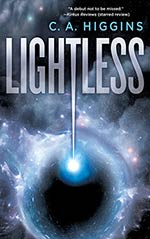
![]() digitaltempest
digitaltempest
5/31/2016
![]()
Lightless is a psychologically driven novel that focuses on its characters more than anything else, so if you prefer your space operas fast and furious, this book may prove to be too slow for your speed. The story unfolds layers at a time as readers try to piece together what's real and what's not as the characters wage psychological warfare against one another. As the story soldiers on, you begin to see frayed edges of the main characters--their weaknesses, their prejudices, their fatal flaws. Despite their beliefs that they're good at what they do, they fall apart. The ship's continuing problems further aggravates this by playing into the familiar theme of man versus machine, which creates a tense backdrop that culminates to a chaotic, explosive end. Higgins employs the laws of thermodynamics to frame this narrative, using it to allude to the environment on the ship and the interactions of the characters with one another, their interactions with the galaxy/power structure at large, and their interactions with the ship itself.
The amount of work done in one direction is the same as the amount of heat transferred in the other, or, the internal energy of an isolated system is constant.
Because of this, a perpetual motion machine cannot exist, and all systems come to an end.
As interesting as this deconstruction of her characters was, and while I certainly understand why she went the direction she did with some characters, it didn't stop me from feeling as if certain characters were a joke, a really bad joke. There were moments when I just felt these characters were completely incompetent and stupid, but that could go hand-in-hand with the overestimation of their abilities. However, I enjoyed this story, so I can forgive that.
Now, this book does suffer from being a bit too "talk-y." I would expect a story like this to be more action oriented, to really capitalize on the claustrophobic, isolated feel of the setting, but a large portion of this book revolves around two characters conversing around the sections of the novel that focus on Althea and the ship. There's nothing wrong with that, but in this case, it made the story feel tedious at times. There had to be better ways to convey the information they exchanged than to have two characters literally sitting in a room together going back and forward for a huge chunk of the novel. While I love a good psychological story, I expected much more to happen in this story than what actually happened. In fact, I feel like the last third of the book is where the pace really picked up and showcased the best of this story.
Fiona Hardingham narrated the story with the kind of straightforwardness you'd expect from a novel in this vein. While most of her men sounded largely the same, she did an excellent job with the female characters' voices, especially a cold, calculated character named Ida Stays.
If you don't enjoy "hard" science fiction, don't fret. Aside from these brief passages about the laws of thermodynamics, the science in this novel is easy to grasp. The science is almost secondary to the conflict. Higgins has created an absorbing and thoughtful read with Lightless. Sabotage, intrigue, and terrorism meets loyalty, freedom, and even a hint of humor in this story. I'm definitely looking forward to visiting this universe again in Supernova, especially to see if we'll be diving into the larger conflict now that we've established the characters.
https://bibliosanctum.com/2016/05/31/audiobook-review-lightless-by-c-a-higgins/